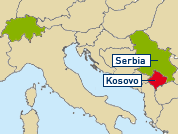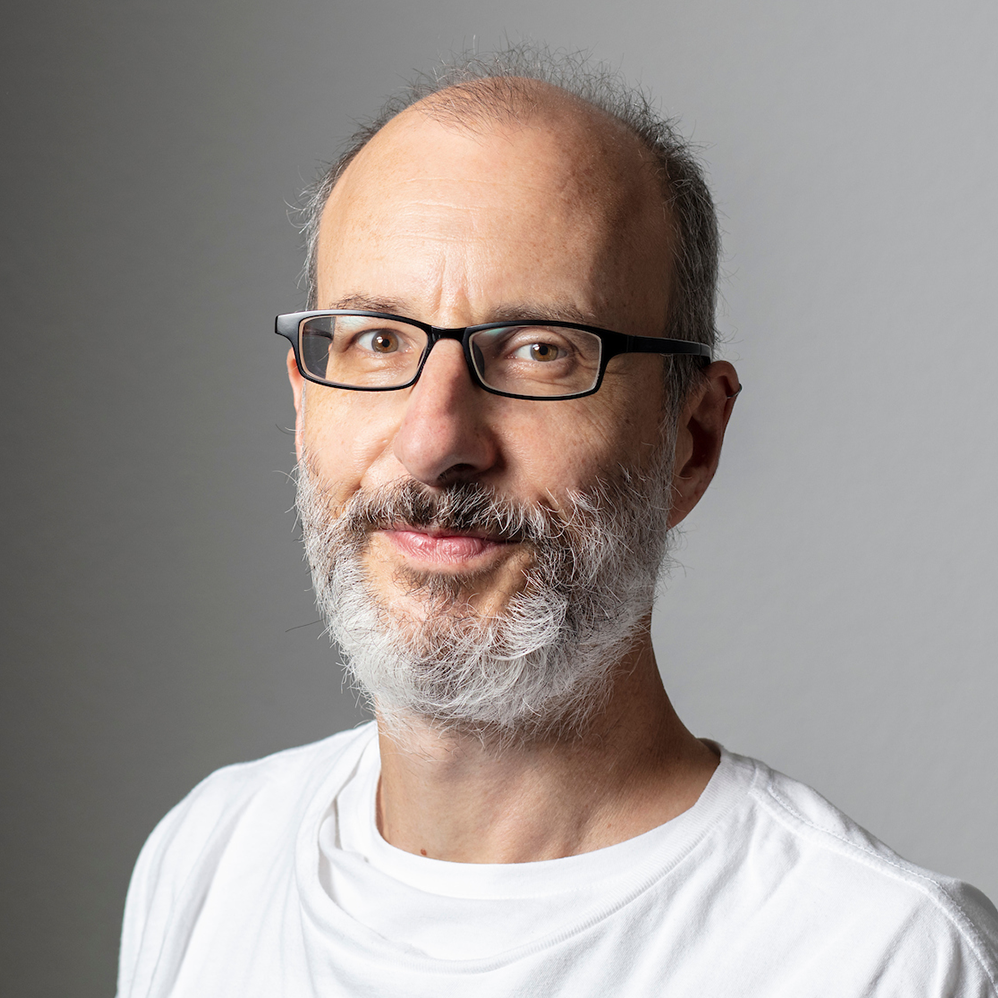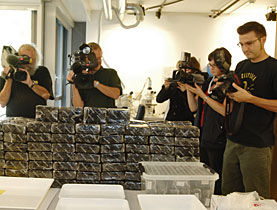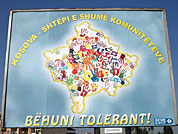Switzerland stays in hearts of Kosovo returnees

Asylum seekers Ramiz and Homez have returned to Kosovo from Switzerland under a special programme and are seeking to build new lives there.
But for both men, memories of their time in Switzerland remain fresh, making their arrival back in their home country bittersweet.
Pristina’s streets are full – high-powered cars with foreign number plates are parked bumper to bumper along the main streets, making life difficult for pedestrians.
Each summer Kosovo is invaded by thousands of expats who come to spend their holidays there.
They come from all over Europe, but Swiss number plates – from Zurich, Ticino and Valais to name but a few – are especially numerous, reflecting the large Kosovo community in Switzerland.
For Ramiz Salihu, around 40 years old, and the young Homez Morina, the sight is a familiar one. They watch the comings and goings of their compatriots with a little envy and nostalgia.
“It’s difficult to live here after 15 years in Switzerland,” admits Salihu, as we accompany him around Skivjan, a village in the countryside around Gjakova, in the west of the province which recently declared its independence from Serbia.
“The economic situation is disastrous and relations with people are more complicated. In Switzerland there was no problem socialising with Serbs, Bosnians or Albanians. If you meet up with the “wrong” people here you are immediately regarded as suspicious,” he added.
Another problem is loans. “If I borrow €100 (SFr158), I have to pay back €200-300 the next month and believe me, it’s better to pay,” said Salihu, who is from the Kosovo Egyptian minority.
Former life
Salihu becomes lost in thought. He quickly brightens up again. “Look, I worked here,” he says proudly, showing a business card of a pizzeria in the Swiss capital Bern.
“I was in Switzerland as a refugee and officially I didn’t have the right to work. But I earned SFr2,200 ($1,974) a month and when I could I sent SFr200-300 to my parents in Kosovo.”
Even here in the village, he says, indicating the rows of houses, people wouldn’t survive if it wasn’t for money sent from abroad.
Salihu, who fled to Switzerland to avoid Serb persecution, remembers with sadness the moment he had to return to Kosovo.
“One day the police came into the restaurant and summoned me to leave the country. I didn’t want to go, I had so many friends, but I didn’t have the choice,” he explained.
But Salihu was at least able to participate in the return assistance programme drawn up by the Federal Migration Office in collaboration with the International Organization for Migration (IOM).
It promotes the voluntary and mandatory return of rejected asylum seekers through a system of benefits.
These are designed to help people reintegrate into their place of origin, as well as provide some structural assistance to their home areas (see side bar). Around 34,000 people have taken part in the Kosovo scheme since 1999.
Return programme
Salihu was able to use the small sums of money he received to buy a rotary tiller for transporting material around the village. He also received training.
“In 2006, two years after I returned from Switzerland, I was given the opportunity of developing a project to help the community. As there’s not enough electricity in the village, we have been granted permission to build a transformer,” he said.
The collaboration between the IOM and the village has borne fruit – many of the 45 families living there still do not have running water, but they can at least run a fridge and a television.
“When I returned home, everyone asked me why I hadn’t stayed in Switzerland and why I hadn’t got married there. Now everyone thanks me for the transformer and thinks that I’m some sort of hero,” said Salihu.
“But I say thank you to the IOM and to Switzerland for making my idea a reality.”
Morina, a 25-year-old Kosovo Egyptian, has also had some success. After seeking asylum in Switzerland for 18 months, he returned to his wife and children in Gjakova at the end of 2006. He was also offered help under the assisted return scheme.
“I was able to buy a wood transport vehicle,” said Morina, who now works with his cousin and is very busy with orders in the summer.
“I earn €10-€20 a day. It’s not bad but I have to save. It’s more difficult to find work in winter.”
Memories of Switzerland
Morina loved playing football in Switzerland. “There’s no time here for sport, I have to work. My children aren’t interested in football, it’s important to eat.”
Morina learned to speak good German during his time at an asylum seekers’ centre in canton Graubünden in the east of Switzerland.
He tried to find work but he was always confronted with the same answer: “Are you from Kosovo? No thanks, but we’ve already had problems in the past…”
Morina always felt angry when his Swiss friends talked about the increasing stigmatisation of Balkan immigrants and the problems caused by some Kosovo expats. “I agree with those who say that ‘bad” elements should be deported. But you shouldn’t tar everyone with the same brush.”
Salihu agrees. “It’s right to condemn those who cause problems but it’s wrong to punish those who behave correctly.”
swissinfo, based on an article in Italian by Luigi Jorio in Gjakova
The purpose of return assistance is to foster the voluntary and mandatory return of rejected asylum seekers through a system of benefits. The Federal Migration Office implements these programmes in conjunction with the Swiss Agency for Development and Cooperation (SDC), the International Organization for Migration (IOM), and the competent cantonal agencies and relief organizations.
It offers the following services: return counselling services in the cantons, individual return assistance, return assistance from reception centres, country-specific return assistance programs and structural aid.
The authorities are concentrating in particular on vulnerable people (the elderly, the sick) and those belonging to an ethnic minority. Kosovo Egyptians are an Albanian-speaking ethnic minority, whose provenance is unclear. It is not sure whether they are related to Egyptians from Egypt.
Population of Kosovo: 2.1 million (2007)
Area: 10,887 km² (Switzerland 41,285 km²)
Official languages: Albanian and Serbian
Ethnic groups: 92% Albanian, 5% Serbian, 3% other (Roma, Ashkali, Gorans, Kosovo Egyptian)
In Switzerland there up to 190,000 people from Kosovo


In compliance with the JTI standards
More: SWI swissinfo.ch certified by the Journalism Trust Initiative



You can find an overview of ongoing debates with our journalists here. Please join us!
If you want to start a conversation about a topic raised in this article or want to report factual errors, email us at english@swissinfo.ch.